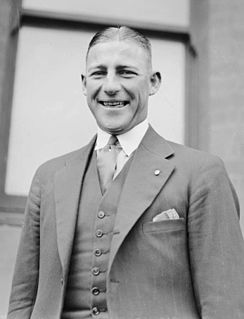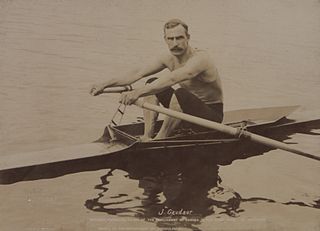Spencer Herbert Gollan was a sportsman who excelled in rowing and golf, and who was also a race horse owner.

Henry Robert "Bobby" Pearce was an Australian three-time world champion sculler of the 1920s and 1930s. He won consecutive Olympic gold medals in the single sculls at the 1928 Summer Olympics in Amsterdam and the 1932 Summer Olympics in Los Angeles. He won the World Sculling Championship in 1933, and twice successfully defended that title in 1934 and 1938. He was a three-time Australian national champion and won the Diamond Sculls at the 1931 Henley Royal Regatta.

Richard Arnst or Dick Arnst, born Jacob Diedrich Arnst, was a New Zealand rower, six times Single Sculls World Champion during the early part of the 20th century.

Darcy Clarence Hadfield was a New Zealand rower who won a bronze medal at the 1920 Summer Olympics in Antwerp. In doing so, he became the first Olympic medallist who started for New Zealand; previous New Zealand medallists had started for Australasia. Subsequently he became the third New Zealander to hold the professional World Sculling Championship.

Ernest James Barry was a British rower and Thames Waterman, five times Sculling World Champion during the early part of the 20th century and winner of the Doggett's Coat and Badge Race in 1903.

William "Bill" Beach was a professional Australian sculler. He was unbeaten as World Sculling Champion from 1884 to 1887.
Joseph Henry Sadler was a British professional rower who twice won the World Sculling Championship. Before 1876, the English Sculling Championship was considered to be the premier event in professional sculling. In 1876, the English Title gained the World status and earlier winners were retrospectively given the title of World Champion.

For the Canadian Footballer and Commissioner, see Jake Gaudaur.
Tom Cole was the Professional Single Sculls World Champion from 1852 to 1854. He resided in Chelsea. At the time, he became the Champion of the Thames which was effectively the Champion of England. After the English title gained the world status in 1876, earlier winners were retrospectively given the World Champion Title.
George Towns was the Australian Single Sculls World Champion from 1901 to 1905 and 1906 to 1907. He was the last of the seven Australian World Sculling Champion who between them held the title almost uninterrupted from 1876 to 1909.

Thomas Sullivan was a New Zealand amateur rowing and sculling champion who later turned professional and challenged for the World Sculling Championship title. He later became a rowing coach.
James Patrick Hannan was the last of six New Zealand oarsman who attempted to win the World Sculling Championship title.
Charles Amos Messenger, a professional sculler, was born ca. 1855 in London where his family was well known in aquatic circles. His father James was a noted sculler and boat builder who in 1854 won the World Sculling Championship from Tom Cole (rower). James held the title for four years until beaten by the well known sculler Harry Kelley.
Major L. Goodsell was an Australian who five times won the professional World Sculling Championship.
Alfred D Felton, known as "Alf", was the first Australian after World War I to win the professional World Sculling Championship. Before the war seven other Australians had held the title.
James Paddon was the second Australian after World War I to win the professional World Sculling Championship. Before the war seven other Australians had held the title.
John "Jack" Arnst, was a New Zealand racing cyclist.












